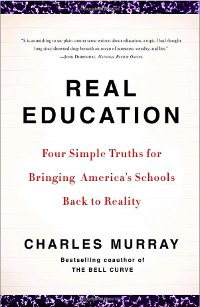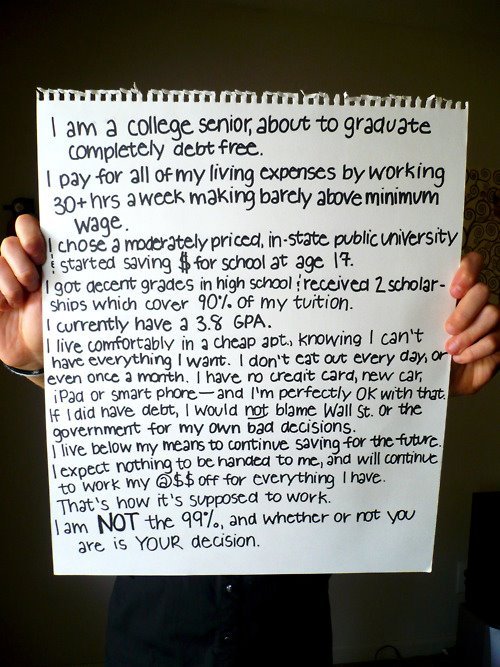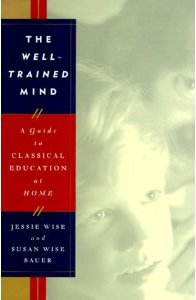There is an article in The American Thinker (h.t. FreeRepublic) that explains just how bad government schools perform relative to their international peers. A phenomena is described that is one of my pet peeves. It seems like everyone in American suburbia believes the government school in their neighborhood is great because their kids get good grades. Well, it turns out they DO get good grades if you compare them to other schools in America. The problem is they are abject failures when compared to their international peers and even worse when compared to homeschoolers. This is a great article. I recommend it highly.
Category: Education
Day 81 of 1000
 As many already know, Kelly and Christian take a “writing” class at the community college where the dear leader of the class lectures on the evils of all things Christian, the beauty of communism and atheism, and the righteousness of drug legalization and abortion. Today’s topic was Christianity. He said he spoke about Christianity because we live in Raleigh. He would have made his outrageous, silly arguments about Hindu if we lived in India. Kelly read up a little over at the Wintery Knight blog to prepare and got a nice response after she tweeted Mr. Wintery Knight himself.
As many already know, Kelly and Christian take a “writing” class at the community college where the dear leader of the class lectures on the evils of all things Christian, the beauty of communism and atheism, and the righteousness of drug legalization and abortion. Today’s topic was Christianity. He said he spoke about Christianity because we live in Raleigh. He would have made his outrageous, silly arguments about Hindu if we lived in India. Kelly read up a little over at the Wintery Knight blog to prepare and got a nice response after she tweeted Mr. Wintery Knight himself.
The “good” professor went on for about a half an hour about the evil’s of the organized church, for which the kids would have had a great deal sympathy if it were not for the his smuggness and arrogance. Like all stories, that of the organized church has two sides. He mentioned nothing about universities, hospitals, scientific method, the printing press, and all the other great foundings and inventions inspired by Christianity.
At the point when he made the claim that Adam and Eve could not have existed because of the scientific evidence for evolution, Christian raised his hand and said, “There is just as much scientific evidence against macroevolution as there is for it.”
“You don’t believe in evolution!” exclaimed the professor incredulously with a look of disdain and horror.
“We DO believe in microevolution. It is grossly arrogant for you NOT to question your own beliefs when it comes to evolution” said Kelly. “That is what you are demanding from us.”
The professor said, “Evolution is established scientific fact” and used several of the standard canards (fossil record, etc.) to establish his point.
Then they were off to the races. Fortunately, during homeschool, Christian and Kelly had read books like The Victory of Reason: How Christianity Led to Freedom, Capitalism, and Western Success by Rodney Stark, Understanding Intelligent Design: Everything You Need to Know in Plain Language by William Dembski and Sean McDowell, Tactics: A Game Plan for Discussing Your Christian Convictions by Greg Koukl, and Intellectuals by Paul Johnson. The professor was armed with shibboleths about the truth of macroevolution and quotes from John Shelby Spong about the virgin birth. John Shelby Spong!?!! You have to be WILDLY out of touch with both current scholarship and reality if you quote John Shelby Spong about virtually anything. He quotes the losers like Noam Chomsky and Bertrand Russell, too.
It is frustrating. Here is a writing a professor who fervently believes he is making students question their beliefs through these profoundly silly arguments. The subject matter is objectionable, but this guy’s incompetence is even more objectionable. He does not appear to understand the difference between scientific method and historic method (very important in discussion of the resurrection). Neither does he understand that it is impossible to argue for the primacy of scientific method without consideration of its philosophical underpinings. I guess I should be grateful he is incompetent with respect to his arguments–he does nothing to get the kids to question their faith or worldview. Still, a lot of taxpayer money is wasted on professors like this throughout the land.
Day 80 of 1000
I found a great article in the Wall Street Journal this morning titled Generation Jobless: Students Pick Easier Majors Despite Less Pay. It had some startling statistics:
Workers who majored in psychology have median earnings that are $38,000 below those of computer engineering majors, according to an analysis of U.S. Census data by Georgetown University.
Wow. The article tells a story about a student who switched from Electrical and Computer Engineering because her team stayed up past midnight in a lab to write a soda machine program. They could not get it to work, so to keep from getting a bad grade, she withdrew from the course. Then she switched from engineering to a double major in psychology and policy management. Her grades went from B’s and C’s to A’s. She said her high school did not prepare her for the rigor of an engineering degree.
So the upshot is that she is willing to work in a low-paying career for the rest of her life because she was unwilling to do what was necessary to pass a few hard classes. I have had this discussion with people before. If you cannot handle a specifc course, you can do a TON of things to make it happen. You can get a tutor. You can take the class two or even three times if needed. You can take a more remedial course, then try the tough one again. Is it worth it to go to school for a year or two more to do something you like and that pays well for the next forty or fifty year? It seems like a no brainer.
The crazy part is that even for those who want to do less technical jobs, it is best to prepare for that non-technical job with a hard degree.
Research has shown that graduating with these majors provides a good foundation not just for so-called STEM jobs, or those in the science, technology, engineering, and math fields, but a whole range of industries where earnings expectations are high. Business, finance and consulting firms, as well as most health-care professions, are keen to hire those who bring quantitative skills and can help them stay competitive.
We joked about this quite a bit, but I wanted to get it into the kids head that, if they went to college (not necessarily a given–preparation for many careers–pilot, electrician, writer, and small business owner are monumentally better served through some type of preparation other than college), they could study their passion, but they needed to start with a rigorous degree. We defined rigorous as anything that involves hard math. The use of hard math and statistics is creating new breakthroughs in a lot of fields right now: medicine, agriculture, sociology, etc., etc. etc.
One of our pet peeves during our homeschool years was a couple of homeschool guys from Oregon who wrote a book titled Do Hard Things when they were in high school, then went off to a liberal arts college whose only majors are Government, Journalism, History, Literature, and Classical Liberal Arts. Those are fine things to study, but are very far from the type of “hard” we are talking about here. The only math I could find in their core curriculum was Euclidean Geometry. If you want to get a book on doing hard things, forego the Harris book and get this one by Katie Davis has done at Azima.
Day 77 of 1000
Our 1000 day plan has given everyone in our family lots of energy to get on track with a lot of stuff. Now that we are in the last third of the semester, Lorena and the kids hit the books hard most nights and most of the time on weekends. We miss workouts more often than we would like, but that is because of all the school work. I like to fill up the time when the kids do their school work with learning projects. I am all fired up to do something cool, but now that Troy has moved on to more important research and we have hit most of our big milestones for the GaugeCam project, I am struggling with finding something that really excites me. It would be very cool to work on a project like this Flying Machine, but do not have the mechanical skills.
I have what seem like very good options, but every one of them have some caveats. BleAx is great, but Kelly will not have time to really jump back into her Betty Blonde comic strip until after spring semester. I could move on with GaugeCam, but we have not really defined what we want to do next. The Android programming is fun, but I have not identified anything that is not already done that I want to do. I work want to work on SQL, but that suffers from the same problem as Android. Maybe I will talk to my buddy Jeff to figure out something to make that requires a control system and vision.
Update: And another thing. I am WAY to fat. When I get in this mode and do not have a project to distract me, I eat way too much. I have to find a project.
Day 74 of 1000
Kelly stayed up until about 2:00 AM Wednesday morning in preparation for a Calculus III test. Like a lot of complicated things, calculus is hard until you know how to do it and have used it for awhile. We were surprised when someone told her that it does not help to study anymore within ten hours of the test. I can think of no reason why that would be true other than to give one’s self time to get some rest. Both Kelly and Christian took the test and did great–maybe even better than expected. When we talked about it later, they both mentioned examples of things they read or learned five minutes before the test started that improved their grade. That has been my experience, too.
One of the things I have told the kids time and time again is to just keep the pressure up. The classes where you get all great grades without too much effort are probably not worth taking because you do not learn much without some effort. You will get some low scores on some homework assignments and labs in those difficult classes about complex subject. You might even get a low score on a test or two. If you quit trying and tell yourself you cannot understand the material when that happens, you can fail the class. The reality is that lots and lots of people have figured out how to do Calculus, Physics, Chemistry, and Statistics. If you study, you can get it. So the key is to not get discouraged and always keep the pressure up–study, study, study.
There are six weeks left in the semester. With Thanksgiving and Finals week, it means there are really only about five weeks of actual class. There are papers to write, speeches to present, homework to submit, and quizzes and tests to take. Everything that lead up to this point was just to get the kids to the point where they have a shot at a good grade. NOW is the time when they have studied hard for three months and are tired, but need to add additional study and work pressure to finish well. If that means it is necessary to work through the weekend and stay up late one or two times per week, so be it. It is the most exciting and nerve wracking part of the semester.
Very important update: In the service of familial and marital peace and tranquility, I must also note that Lorena got an “A” on her Financial Accounting mid-term.
Day 67 of 1000
Andrew does it again. Here is a quote from an article for which Andrew sent me a link this morning:
Asked whether he thought computer science should start being introduced very early in kids’ educations, Gates said he actually would start with statistics.
“There’s certainly a level of complex, symbolic thinking that is valuable to be exposed to. Personally, I might put statistics in instead of geometry. I’d put statistics in before calculus,” Gates said. “Where computer science belongs in that hierarchy I don’t know.”
Kelly decided to try to get a degree in statistics about a year ago. We have wondered whether or not that is the right decision, but time after time, we run into stuff like Gates quote. Previous to that, we saw in Forbes that Irene Rosenfeld, the CEO of Kraft Foods (home to Canada’s passion–Kraft Macaroni and Cheese), received a Doctorate in Marketing and Statistics. Statistics is ubiquitous. There is a need for statisticians in virtual every field. Kelly leaned toward graduate work in Journalism after her Statistics degree, but we have seen that she has many, many more options. At one time or another we have spoken about Management, Marketing, Publishing, Sociology, Industrial Engineering, and a variety of other fields. Statistics provides a wonderful base for all of them. She still has some very hard classes to complete for her degree and we are several years off, but she has some wonderful options.

 Rember the EuroStudent Hipster in Kelly’s Science Fiction class? Remember the commie, pro-drug, 1960’s throwback from Christian’s and Kelly’s and English Composition class? The day the commie spent the entire “writing” class making inane, irrational arguments about the existence of God (e.g. You cannot use the fact of object moral values as an argument for the existence of God because that is in the category of ethics, not religion. Jesus could not have been God because God is supposedly infinite and, as a human, Jesus had to be finite.). Well, the two of them were seen talking earnestly together on campus. Hmm…
Rember the EuroStudent Hipster in Kelly’s Science Fiction class? Remember the commie, pro-drug, 1960’s throwback from Christian’s and Kelly’s and English Composition class? The day the commie spent the entire “writing” class making inane, irrational arguments about the existence of God (e.g. You cannot use the fact of object moral values as an argument for the existence of God because that is in the category of ethics, not religion. Jesus could not have been God because God is supposedly infinite and, as a human, Jesus had to be finite.). Well, the two of them were seen talking earnestly together on campus. Hmm…
Day 53 of 1000
 Charles Murray authored a book titled Real Education: Four Simple Truths for Bringing America’s Schools Back to Reality. It is about the bankruptcy of the American education system. He is a big proponent of the idea that it is bad to get a Bachelors degrees that costs tens of thousands of dollars in communications, sociology, or some other soft field where the few available jobs do not pay enough to retire debt incurred to get the degree in the first place. He and Peter Thiel, one of the founders of Pay-Pal, teamed up to defeat two academics from Duke and Northwestern University on the topic “Too Many Kids Go to College“.
Charles Murray authored a book titled Real Education: Four Simple Truths for Bringing America’s Schools Back to Reality. It is about the bankruptcy of the American education system. He is a big proponent of the idea that it is bad to get a Bachelors degrees that costs tens of thousands of dollars in communications, sociology, or some other soft field where the few available jobs do not pay enough to retire debt incurred to get the degree in the first place. He and Peter Thiel, one of the founders of Pay-Pal, teamed up to defeat two academics from Duke and Northwestern University on the topic “Too Many Kids Go to College“.
I think Murray and Thiel have a very strong case, but the thing that caught my eye in the article was this statement by Murray during the debate:
When I agreed to debate on too many kids are going to college, I thought of college as being four-year colleges leading to the BA. I didn’t think of it as a whole range of community colleges and the rest. Anyway, that’s the way I’m going to argue tonight because if the proposition were that too many kids are trying to get more education and training after high school, I wouldn’t have accepted the position on the affirmative. Almost everybody needs more education after high school. What they don’t need is to chase after this fraudulent, destructive, antediluvian thing called a BA. The thesis of my argument really is that the BA is the work of the devil.
I think Murray has it just about right. A BA is OK for some kids, but a whole lot more kids need to do self-learning or get their education in apprenticeships and community college certificate programs. I think he has it just about right. Kelly got very high score on her college entrance ACT, has the right ethnicity, does volunteer work, knows the right people, and could probably get into one of the Ivy’s. Her cousin has degrees from both Dartmouth and Harvard. One of Kelly’s schoolmates is a high school senior who is dual-enrolled with Kelly at the community college. He is applying to ALL of the Ivy’s as well as Duke, Stanford, and some other big name expensive colleges.
Her question was answered for her when she saw this image from Dom Giordano’s Facebook page. She can go to Stanford or an Ivy for grad school on a teaching or research assistantship. Which would I rather have as an employee, a self-satisfied, entitled kid with an Ivy League education or this guy? It is a no-brainer. I want this guy:

Update II: More education sob stories from NRO.
This is the first in a series of articles about why we used Sonlight Curricula in our homeschool. Here is a page that holds a description of the series and links to the other posts in the series. We bought core packages for what would be third through tenth grades in a traditional school. Kelly used the program from fifth through tenth grade. Christian used the program from third through eighth grade. This series mostly describes what we did for all the subject areas except math, music, and art. I have already written pretty extensively on this blog about what we did for math and plan to do a future series on our art art program. We bought most, but not all of our core materials from Sonlight and followed their curriculum guides with a fair amount of rigor. Like most other homeschoolers, we deviated in minor ways where we saw fit.
 About half of the books you see in the mess in the picture below came from Sonlight. We are very thankful we used their curriculum programs as a base for our homeschool for every year we homeschooled after the first grade. Kelly started out at a neighborhood Christian kindergarten. We started homeschool the year after that with programs we put together ourselves. We used Explode the Code to teach Christian how to read when he was four. I read a wonderful book titled, The Well-Trained Mind: A Guide to Classical Education at Home by Susan Wise Bauer that formed the basis for Kelly’s first grade year. Its precepts heavily influenced all our seven homeschool years. I have two rubs against the book that pushed me toward prepackaged curricula: 1) The author seems to be supremely well equipped to talk about history, literature, and the social sciences, but very much less qualified to talk about math and the hard sciences. 2) The methods proposed in the book require an incredible amount of work with respect to material selection and daily study planning. Nevertheless, that is what we did with Kelly in the first grade. It worked superbly for us both in terms of the joy we derived from the day to day work and the academic results.
About half of the books you see in the mess in the picture below came from Sonlight. We are very thankful we used their curriculum programs as a base for our homeschool for every year we homeschooled after the first grade. Kelly started out at a neighborhood Christian kindergarten. We started homeschool the year after that with programs we put together ourselves. We used Explode the Code to teach Christian how to read when he was four. I read a wonderful book titled, The Well-Trained Mind: A Guide to Classical Education at Home by Susan Wise Bauer that formed the basis for Kelly’s first grade year. Its precepts heavily influenced all our seven homeschool years. I have two rubs against the book that pushed me toward prepackaged curricula: 1) The author seems to be supremely well equipped to talk about history, literature, and the social sciences, but very much less qualified to talk about math and the hard sciences. 2) The methods proposed in the book require an incredible amount of work with respect to material selection and daily study planning. Nevertheless, that is what we did with Kelly in the first grade. It worked superbly for us both in terms of the joy we derived from the day to day work and the academic results.

The Library Wing of Our Bonus Room – Homeschool Materials
All was well, but we decided to put the kids in government school when Christian was in kindergarten and Kelly was in the second grade. The reason was that my job did not allow for sufficient time to prepare, let alone deliver according to the methods and materials Susan Wise Bauer so effectively described in her guide book. The schools the kids attended in Sherwood, Oregon were really pretty good. They stagnated a little academically, but made a few friends and enjoyed themselves very much.
We moved to Albany, Oregon at the beginning of Kelly’s fourth and Christian’s second grade years. We are very thankful to the government schools in Albany because they shocked us out of our lethargy and motivated us to return our kids to homeschool. The teachers, the teacher’s aides, the principal, the school lunches, and just about everything else about those schools was bad for our kids in just about every way. Our experience suggests that government schools are a bad places to “socialize” children. Our kid’s spirits got harder and more aggressive and their academics suffered greatly. The teachers’ disinterest and aggressive worldview advocacy, an unsupportive principal, totally underqualified and surly teachers’ aides, and a plethora of other problems are a story for another day–I took extensive notes on all this while it happened and plan to write about it before too long. I would be remiss in saying that our experience in the Albany government schools was all bad. We know have a much more intimate understanding of the need for parents to take responsibility of their children’s education and not leave it to “professional” educators. Also, there WAS a wonderful school secretary in one of the schools who we appreciated very, very much.
Well before the end of our Albany government school year, we decided we would homeschool the next year. I had a great job, but worked about ten hours per day, so I only had three or four hours in the evening after dinner to work on the kids school. Lorena was (is) a stay at home mom, so she could run the kids to music lessons, homeschool groups, swim lessons, art classes, and all those sorts of things. She did not feel equipped to teach the homeschool. She speaks beautiful English, but Spanish is her first language. She kept the house, cooked for everyone, and usually attended community college three nights per week, so she had her hands full. I agreed to act as the teacher.
I had the time an energy to do the day to day teaching in the evenings and weekly lesson plans on the weekends. I love this stuff, but after my experience with Kelly’s first grade year, I knew I did not have enough time to follow The Well Trained Mind guide in the way that had worked so well for us previously. I wanted to do that, but the time required to search for materials and create lesson plans left little one-on-one time with the kids. That was the other thing. The effort to teach Christian to read in preschool took only about twenty minutes per day for about three months, so I could spend a whole lot more time on teaching Kelly. Now, I had two kids that required a couple of hours of one-on-one time plus an hour or so of planning each night and six to eight hours of preparation on the weekends if I were to do it properly, in the way that had worked so well with Kelly in the first grade. I just did not have the time.
I looked at a lot of programs that summer before Christian’s third grade year and Kelly’s fifth grade year of school. I will explain why we chose Sonlight rather than one of the others in the next installment.
